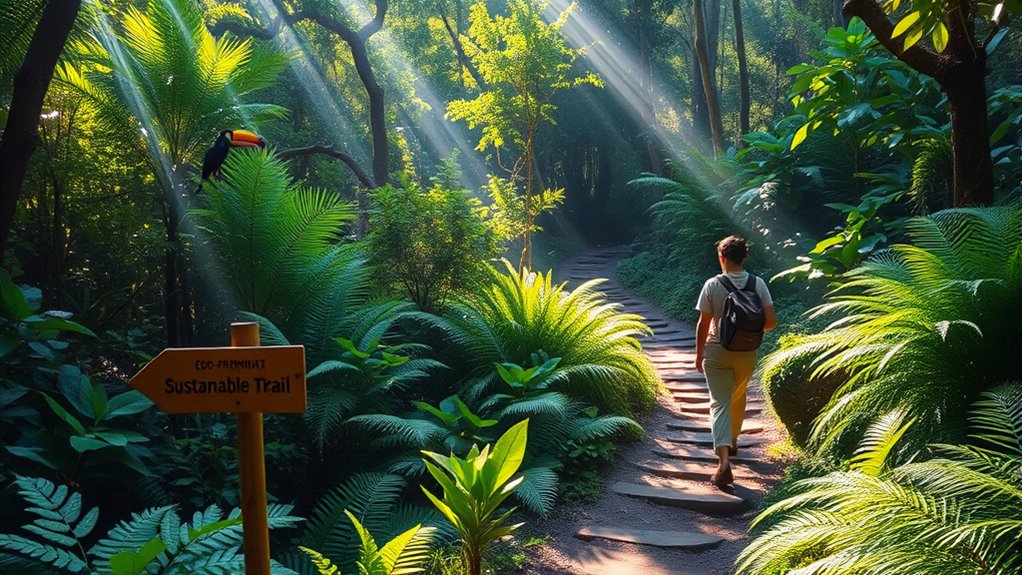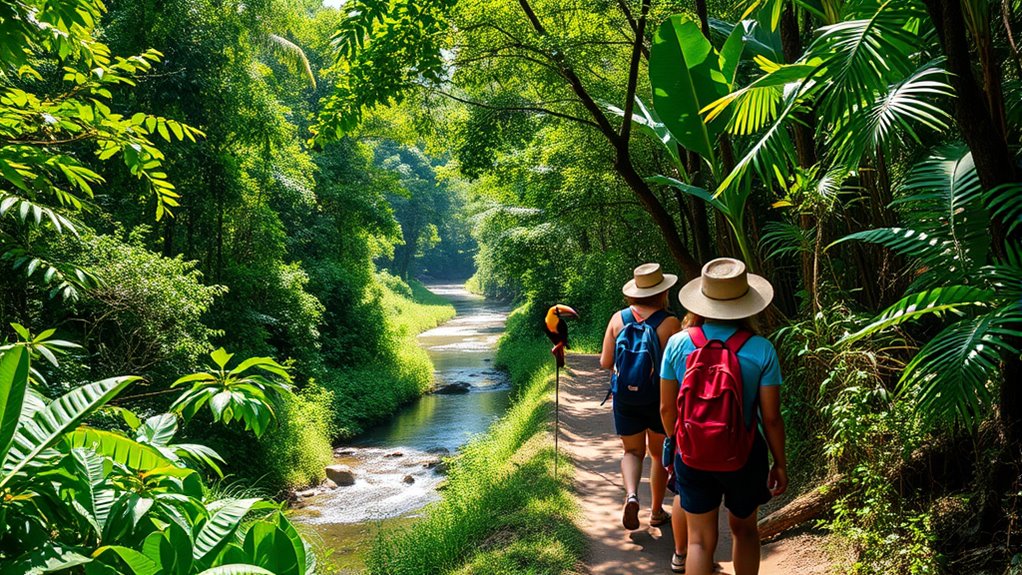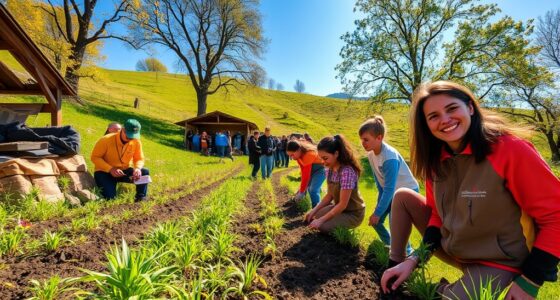Eco-tourism lets you travel responsibly by supporting conservation efforts, respecting local cultures, and reducing your environmental impact. You can choose eco-friendly accommodations, participate in community projects, and promote wildlife protection. By making thoughtful choices, you help preserve natural habitats and local traditions while enjoying meaningful experiences. Focusing on education and responsible behaviors guarantees your travels benefit both the environment and communities. Keep exploring to discover more ways to make your trips truly sustainable and impactful.
Key Takeaways
- Practice responsible travel by respecting local cultures, ecosystems, and wildlife during your eco-tourism activities.
- Support eco-friendly accommodations and sustainable transportation options to minimize environmental impact.
- Engage with local communities by patronizing small businesses and participating in cultural preservation efforts.
- Educate yourself on environmental issues and responsible behaviors to reduce your carbon footprint and pollution.
- Participate in conservation initiatives like habitat restoration or wildlife monitoring to actively protect natural resources.

Have you ever wondered how travel can benefit both nature and local communities? Eco-tourism makes this possible by promoting responsible travel to natural areas that not only protect the environment but also support the well-being of local people. This form of tourism is built on principles like conservation, community engagement, and sustainable practices. When you choose eco-tourism, you’re helping to provide economic incentives for maintaining biodiversity and preserving natural heritage. Your involvement can directly increase local employment opportunities and help communities develop their capacity to manage tourism sustainably. Plus, eco-tourism enhances your understanding and appreciation of the environment and local cultures through interpretive programs and educational experiences.
Eco-tourism promotes responsible travel that benefits nature and local communities through conservation, engagement, and sustainable practices.
By participating in eco-tourism activities, you actively contribute to reducing your carbon footprint. For example, you might opt for locally sourced food, which minimizes the environmental impact associated with imported goods. Eco-tourism also encourages practices that generate less waste and pollution, supporting the protection of pristine areas and wildlife habitats. Many eco-friendly accommodations are designed to operate sustainably, utilizing renewable energy sources and environmentally friendly materials, further reducing their ecological impact. These efforts help fund conservation initiatives aimed at safeguarding wildlife and ecosystems, ensuring they thrive for future generations. Incorporating sustainable infrastructure can further lessen ecological impacts and promote long-term resilience in eco-tourism destinations.
Community involvement is at the heart of eco-tourism. When you travel responsibly, you support local economies by patronizing small businesses, artisans, and service providers. This direct economic support can lead to increased employment opportunities and help preserve local cultures and traditions. Many eco-tourism projects actively involve communities in planning and management, empowering residents to benefit financially and socially from tourism. Respecting indigenous rights and beliefs is fundamental, fostering a more inclusive and ethical approach to travel.
Eco-tourism also emphasizes sustainable practices, such as constructing low-impact facilities and using local resources responsibly. Educating travelers about these practices raises awareness of environmental issues and encourages responsible behavior. Furthermore, the global ecotourism market is projected to reach $249.16 billion in 2024, demonstrating its rapid growth and increasing importance. Additionally, integrating AI-driven analytics can help optimize resource management and reduce environmental impact in eco-tourism operations. By engaging with local communities, you help create a tourism model that benefits both visitors and residents, ensuring that tourism remains a positive force for conservation and community development.
Wildlife conservation is another key component. Ethical wildlife encounters promote responsible viewing and avoid harmful interactions, while conservation funding generated through eco-tourism supports the protection of endangered species and habitats. Many programs offer volunteer opportunities, allowing you to participate directly in conservation activities, from habitat restoration to wildlife monitoring. These experiences deepen your understanding of the importance of protecting biodiversity and respecting animal behavior.
Frequently Asked Questions
How Can Travelers Identify Truly Eco-Friendly Tour Operators?
To identify truly eco-friendly tour operators, you should look for certifications like GSTC, Green Key, or Preferred by Nature, which show they meet sustainability standards. Check if they regularly audit their practices and report transparently. Confirm they prioritize reducing carbon footprints, protecting wildlife, supporting local communities, and using sustainable infrastructure. By choosing operators with these credentials and practices, you guarantee your travel supports environmental and social responsibility.
What Are the Best Practices for Minimizing Waste While Traveling?
Imagine you’re packing a knight’s bag, only filled with reusable essentials. To minimize waste, carry reusable bottles, bags, and utensils, and avoid single-use plastics. Choose accommodations that don’t rely on disposables, and always dispose of waste properly, recycling when possible. Use digital tools for eco-friendly options, and opt for low-impact transport like trains or walking tours. These actions help you reduce waste and leave a lighter footprint everywhere you go.
How Does Eco-Tourism Impact Local Communities Economically?
You see, eco-tourism boosts local economies by increasing visitor spending on accommodations, food, and activities. It creates jobs for residents, like guides and service workers, and generates revenue for conservation efforts. Indirectly, it supports local businesses and encourages entrepreneurship. This diversification helps rural communities thrive, reduces reliance on harmful industries, and improves infrastructure. Overall, eco-tourism provides sustainable economic benefits, empowering local people while protecting natural environments.
Are There Certifications for Eco-Tourism Accommodations?
You’re wondering if there are certifications for eco-tourism accommodations. Yes, several certifications exist, like GSTC, EarthCheck, Green Key, Green Globe, and TripAdvisor Green Leaders. These certifications assess environmental practices, social responsibility, and cultural preservation. They involve application, third-party audits, and annual reviews. Getting certified boosts your credibility, attracts eco-conscious travelers, and promotes sustainable practices, giving your accommodation a competitive edge while ensuring ongoing compliance with global sustainability standards.
How Can Travelers Support Conservation Efforts During Trips?
While you might think your trip is just about sightseeing, you can actively support conservation efforts. Choose eco-friendly accommodations, participate in local conservation projects, and respect wildlife and natural habitats. By making responsible travel choices, you help fund preservation initiatives and empower local communities. Your actions, even small ones, can create a ripple effect, ensuring beautiful ecosystems thrive for future travelers and generations to come.
Conclusion
By choosing eco-tourism, you’re not just seeing new places—you’re helping preserve them. Every responsible choice you make, from reducing waste to respecting local cultures, adds up. Remember, a journey of a thousand miles begins with a single step, so start small but think big. Your actions can turn travel into a force for good, proving that with patience and commitment, you really can have your cake and eat it too.









